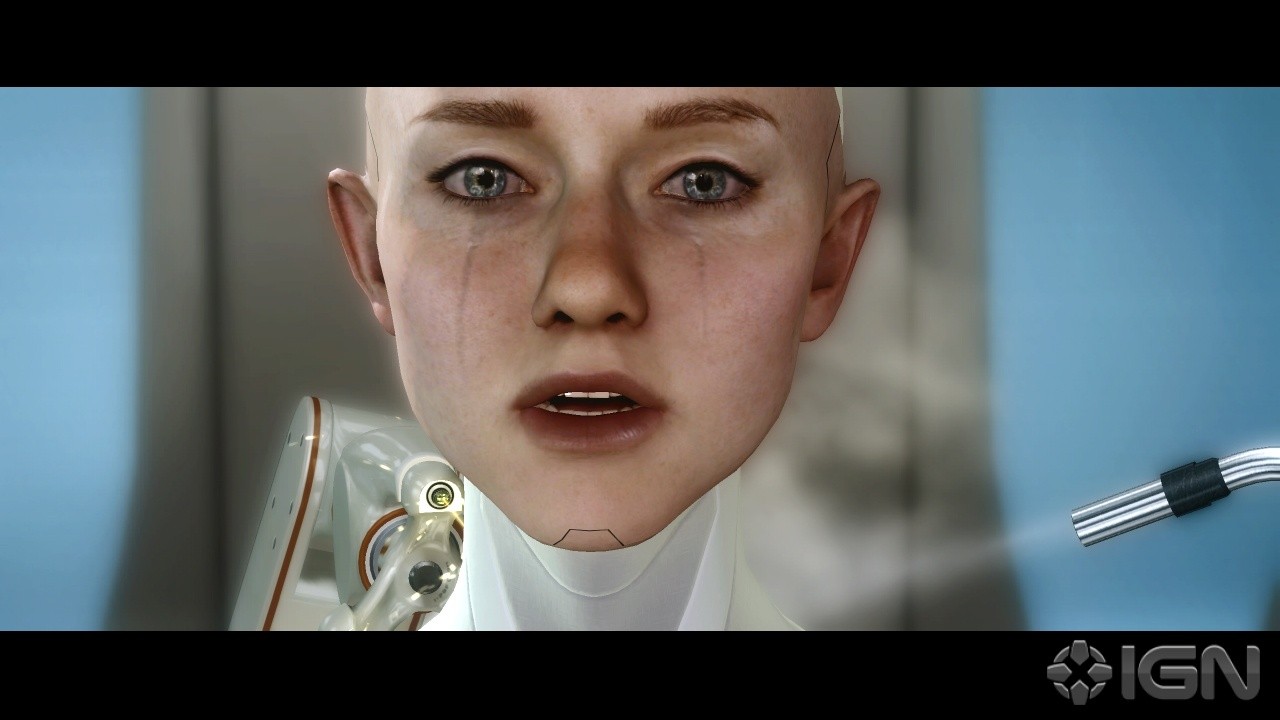So many video games ask little from the player in terms of emotional engagement, and that’s great if I just want to use plants to defend my house from zombies.
But there are games that require added attention and these games are well worth the investment of thought. When I play a video game, I’m looking for a personal experience, one I can take something away from and think about while I’m not playing. If I blow up Planet Z, should I feel guilty? If I break into an AI’s house and get caught, should I ask for forgiveness? I don’t necessarily want a game to be a replacement for life, but I want my gaming experiences to enhance my life, causing me to think and react to situations differently. I think video games do have ethical repercussions for the player, whether or not anyone’s keeping score. But most importantly, video games give us second chances.
A year ago today, I viewed a short film showcasing the abilities of the video game developer Quantic Dream, responsible for titles such as Indigo Prophecy and the critically acclaimed Heavy Rain, both of which feature dynamic storytelling and cutting-edge graphics. The short film is titled Kara after the film’s protagonist, a domestic android.
For those of you who are unfamiliar with android lore, I’ll take a brief moment to explain what’s at stake. Throughout sci-fi history, robots are thought to be soulless and void of emotion, therefore not worthy of respect or fair treatment. Since “robot” is a loose term, fiction has developed androids, beings resembling humans in both form and function, but that is meant to be their limit. As computations increase in their complexity, as do functions an android possesses and “thoughts” it is able to express. These thoughts and expressions can fool a human being into believing the android is actually alive, and so too will the android believe it herself. This is often viewed as a glitch in the programming, something that can be corrected. Does a body without a soul constitute life? A mind without a body?
This is where we find Kara.
The film begins by allowing the viewer to become a fly on the wall of Kara’s assembly chamber. As her cybernetic limbs are snapped and welded into place, Kara is interrogated by an ominous male voice on her abilities ranging from foreign language prowess to her awareness of being a sexual partner – all of which would be required to fulfill her partner’s need without asking anything in return, as her battery is nearly inexhaustible.
When the male voice announces to Kara that she is meant to be a sort of “merchandise,” Kara immediately becomes confused. She thought she was meant for something else, not to be another’s possession. The male describes her thought as a malfunction and begins disassembling her. Kara cries out to stop the disassembly and agrees to conform, to play along as a piece of merchandise. She steps onto the conveyor belt with many other androids that look just like her.

At first, I was completely taken aback by Quantic Dream’s graphics engine and I was admittedly moved by the story and Kara’s plight. I felt sorry for her as the machines tried to take her apart, and got chills when she cried out for them to stop. Quantic Dream had done its job: the team created a character I felt attached to, one I was willing to stick it out for and play to the end. It wasn’t until the second or third viewing – and the coaxing of my girlfriend – that I noticed the short film was heavily charged with feminist undertones.
Hindsight is 20/20, and I can’t believe I didn’t see the influence sooner. There was a reason I had such a strong emotional reaction, and it came from a game developer on International Women’s Day. I was ashamed to realize this time last year that I didn’t know when International Women’s Day was or that I had been lured into it with a video from one of my favorite game developers.
Since that day, my awareness and involvement with women’s issues has grown. I realized that feminism isn’t the man-hating stereotype I once thought it was limited to. Feminism to me is something so much larger. It’s an examination of the underprivileged and voiceless groups in our society.
This may or may not be true, and I may be labeling myself as ignorant or previously ignorant, but I think I see these issue more clearly now, while they may not otherwise been visible.
Video games and other sorts of storytelling media can be the testing grounds for new ideas, ones often restricted to our imaginations. Who’s to say whether or not Kara gained consciousness in that moment of assembly? Where does this leave a game player when deciding whether or not to “deactivate” a malfunctioning mind? These questions are certainly relevant to the featured android Kara and her future, but it speaks to the equality of all peoples regardless of race, sexuality, and gender. I hope the future of video games take these points into account and, as videogames become more mainstream, the ideals may be carried along with them.
Alan is a staff writer for Girls in Capes and holds degrees in psychology and creative writing from the University of Toledo. He has an avid interest in technology and video games.





![[Guest] Why Stories are Becoming Increasingly Important in Video Games](https://girlsincapes.com/wp-content/uploads/2016/09/isa-internalimage.jpg)
